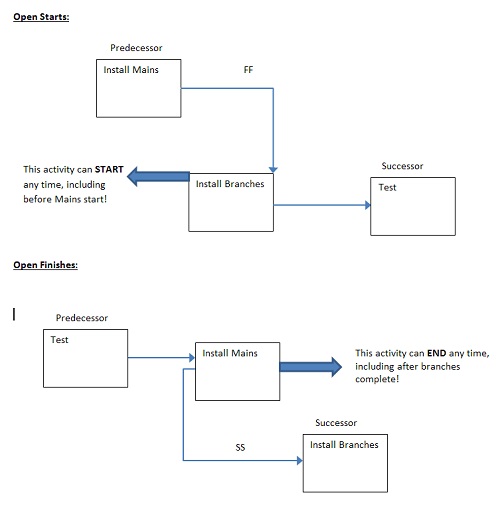By Paul Levin, PSP
Open-Ends vs. Open-Starts/Open-Finishes
Most construction professionals understand "open-ends" in the context of a critical path method (CPM) schedule. Open-ends are activities that have either no predecessors or no successors. Ideally, a schedule has only two such activities on a project - a start milestone which does not have a predecessor, and a finish milestone that does not have a successor. Additional open-ends may find their way into a schedule by the way of interim milestones and/or simply a failure to add a finish activity. For example, Microsoft Project will not allow a single pair of activities to have both a start-to-start relationship and a finish-to-finish relationship, not an uncommon situation encountered in Oracle Primavera and other CPM programs. This may lead to the scheduler to simply not put a successor on one of the two activities.
The issues with open-ends is they lead to problems with correctly computing the critical path. In fact, a number of construction schedule specifications, including Caltrans, TxDOT and the U.S. Dept. of Veteran Affairs for example, bar the use of open-ends other than for the project start and finish. Open-ends can result in illogical activity sequences and misleading float calculations that would otherwise not occur with proper relationships in place.
Similar to open-ended activities are "open-starts" and "open-finishes," which are also called "dangling activities." Each of these activities has at least one successor and one predecessor, but the construction of the relationship types mimics an open-ended activity. One example of an open-start is an activity with a finish-to-finish predecessor, allowing the successor(s) to start any time, including prior to the predecessor. An open-finish is an activity with a start-to-start successor, allowing the predecessor(s) to finish any time, including after the successor. See illustration below. These have the same effect as open-ends, and their use should similarly be discouraged.

Recognized scheduling expert Farid Saddik discusses this subject in more detail, including other circumstances that can create an open-start or open-finish situation. Click here to download a copy of Scheduling Best Practices - Monitor and Remedy Dangling Activities. Be sure to check out the other scheduling and project management articles available at Saddik's website here as well.
Learn more about these and other important CPM schedule tips and techniques on November 1, 2016 when Bill Ibbs presents a 90-minute webinar on Construction Scheduling: Advanced Techniques.


